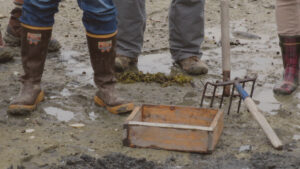Paper by Tyler Quiring on documenting coastal livelihoods published in Environmental Communication
 Tyler Quiring, who completed his doctoral degree at UMaine in May, is lead author on a paper published this spring in the journal Environmental Communication. Tyler worked on the Mitchell Center’s Safe Beaches & Shellfish and Future of Dams projects, in connection with the New England Sustainability Consortium. The paper, “Affective Encounters with Tidal Livelihoods: Digital Field Rhetorics for Justice and Care,” is coauthored by Bridie McGreavy and Carter Hathaway. Bridie is assistant professor of communication and journalism at UMaine and a Mitchell Center faculty fellow; Carter received an M.A. in communication and journalism from UMaine and worked with Tyler and Bridie on the Safe Beaches and Shellfish project.
Tyler Quiring, who completed his doctoral degree at UMaine in May, is lead author on a paper published this spring in the journal Environmental Communication. Tyler worked on the Mitchell Center’s Safe Beaches & Shellfish and Future of Dams projects, in connection with the New England Sustainability Consortium. The paper, “Affective Encounters with Tidal Livelihoods: Digital Field Rhetorics for Justice and Care,” is coauthored by Bridie McGreavy and Carter Hathaway. Bridie is assistant professor of communication and journalism at UMaine and a Mitchell Center faculty fellow; Carter received an M.A. in communication and journalism from UMaine and worked with Tyler and Bridie on the Safe Beaches and Shellfish project.
Tyler used innovative web-based approaches to tell the stories of clammers and help people learn more about the value of clamming in Maine’s culture and economy. The Clam Cam website he helped to create promotes learning about and celebrating the culture of clamming.
“We worked with clammers on Maine’s coast to develop an approach for documenting clam digging using body-mounted cameras,” Tyler says of the research. “We found that clammers use a range of tools to adapt to diverse and changing mudflat conditions and that ‘digital field rhetoric’ as a method is a way for researchers and their collaborators to navigate complex and challenging inequities and social-environmental justice issues. We and others are building on this approach to support ongoing collaborations with the Penobscot Nation and the Passamaquoddy Tribe.”
Tyler may be contacted at tylerdq@gmail.com.
